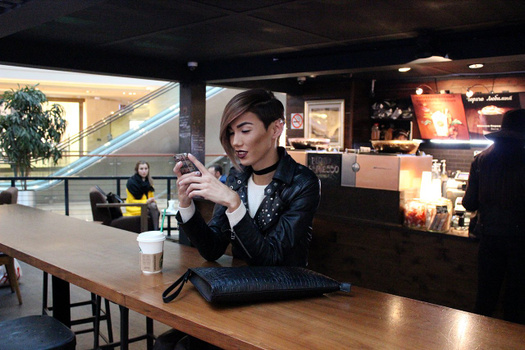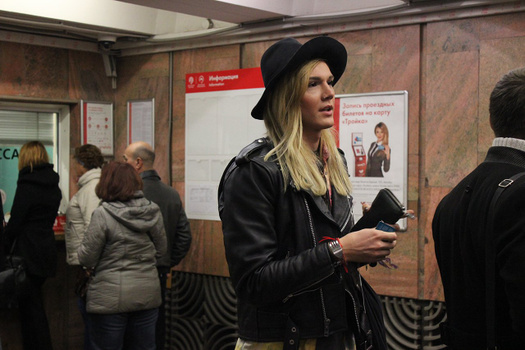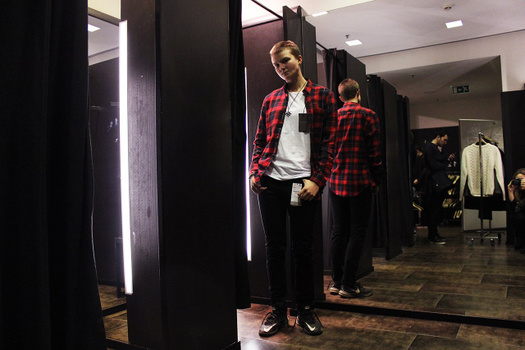‘Everyone is treated with tolerance, except on the Internet’ Genderqueer people talk about their lives in Russia
Мы рассказываем честно не только про войну. Скачайте приложение.
Recent sociological research says the gender binary is going out of fashion. The gender spectrum includes more possibilities than “male” and “female,” and people who fall elsewhere on the spectrum often identify as nonbinary or queer. In 2016, the dating app Tinder added a “nonbinary” category, and within less than one year, over 13 million nonbinary couples found each other on the app. Meduza spoke to three young Russians whose identities bring together the traditionally masculine and the traditionally feminine.
Zaki
24, engineer

I was born in Ufa, and I have been performing on stage since childhood. I entered recitation contests, ran them myself, and then I started singing. I always felt like I was different. I played with Barbie dolls; I liked dressing them up. I developed some psychological complexes, and I tried fitting in with my peers, but I always stood out.
I was trained as an engineer, but I didn’t talk much with my classmates at college. We had completely different interests. The changes started in my second or third year. At that point, I still didn’t look like a woman — I’d only started making myself prettier. I grew out my hair and changed my style, but I still only wore men’s clothes. At home, I would stand in front of the mirror and tell myself I was beautiful. That helped me get rid of my complexes.
It’s not like there was a single breaking point. I moved to Moscow still looking like I did in Ufa. I used minimal makeup: powder and blush, just to cover up any blemishes. I started go-go dancing at the Paradise nightclub. At work, they hired makeup artists for me, did my hair, and emphasized certain features of my face. I saw what my pluses and minuses were, memorized them, and started repeating the makeup routines at home. I was becoming more feminine.
I was a boy who danced in a bikini, heels, and makeup, and that flamboyant image attracted attention to me. This was when androgynous models were becoming popular, but I wasn’t trying to integrate myself into some kind of trend — I just tailored my appearance to my internal sense of myself. Now I buy both men’s and women’s clothing. I come up with various looks in my head and then search for the pieces that I need.
I took part in a number of commercial shoots, mostly for Internet magazines, and I thought about becoming a professional model. But in Russia, they don’t know how to work with this kind of physique. In this business, people are always looking for what will sell best, and working with a model like me is a risk in this country.
I have very understanding parents. They saw how I developed and how I grew, and they recognize that everything I do has a valid cause behind it. No one at home has ever made a scene about it. Sometimes, one of our relatives says something unpleasant, but my mom puts a stop to it right away.
I have a younger sister, and she’s happy to have a brother like me. When I come visit, I dye her hair, take her around to salons, and bring her loads of clothes. I’ve been taking care of her since we were kids, and I encouraged traits in her that I felt I lacked. And she’s grown up to be a strong, athletic young lady.
Feminine boys always run into hostility, but because I essentially look exactly like a woman at this point, I don’t have those kinds of problems. It’s true that in public places or when I’m talking to strangers, I try to avoid using verbs that reveal my gender (I refer to myself using masculine grammar). When young men introduce themselves to me, I chat with them, let them get accustomed to me. Toward the end of the day, I admit that I’m a man. Of course, their jaws drop at first, but then they start rethinking things a bit. More often than not, we stay in touch, becoming friends and sometimes something more.
I had relationships with girls when I was in school, and I didn’t doubt my orientation at all until I met my first boyfriend. But even then, I considered myself bisexual. My last relationship ended half a year ago. I introduced myself to him as a woman, and it was only later that someone told him I was a boy. But he stayed in touch, and our acquaintance grew into a relationship. In general, all of my boyfriends have been straight. I have always been their first and, I think, their last.
I don’t know what I’ll be like in five years. It’s a bit scary, and I don’t want to think about it. At this point, I can keep allowing myself to look like this. If I end up wanting to get married and start a family, it’s important to me that my kids have a full-fledged mom and dad. For that, I would have to meet a woman who would inspire feelings in me. I do not want a same-sex marriage for myself because I’m not prepared to adopt. I want my child to be my own biological child. On top of that, in our country, taking the other road and starting a same-sex family is impossible right now. I don’t want my child to be bullied at school. But so far, I don’t feel ready to change enough for someone to call me “dad.”
I’ve also never considered getting a sex change. I’ve been offered mammoplasty and a sex-change operation — with all expenses paid, even. But then I wouldn’t be me, and there’d be no turning back afterwards. I recognize that I was born a boy, and no matter how many operations I get, I’ll never be a full-fledged girl. My individuality lies in the fact that, as a man, I look better than some women.
Oleg
26, programmer and makeup artist

Everything started in 2006, when the emo movement came to Russia. I was inspired by pictures on the Internet: photos of boys with bangs in skinny jeans. The changes happened very slowly. In the beginning, I started using foundation, then blush. I started wearing women’s clothing only later. It’s not that important to me now whether I buy men’s clothes or women’s. If I like something and it looks fabulous on me, then I’ll definitely buy it.
But then everyone turned their backs on me. I started feeling pressure from my friends, my classmates, and my parents. At school, I had run-ins every day not just with my peers but with my teachers, too. In 11 years, whenever the boys would high five, not a single one would even touch my hand. When students walked into a classroom, first the girls went in, then me, and then the guys. I was always the transition between the two sexes. That was really important for the boys — they’d make a scene and refuse to step across the threshold of the classroom, if I hadn’t gone in yet. “What’s with your clothes?” “What’s with the pink purse?” “What’s with the bangs?” I heard these questions every day. At parent-teacher conferences, the teachers would discuss my appearance.
That was all many years ago now, and I don’t even remember when I last got that kind of reaction. In Russia, people are becoming more tolerant. I came to my last reunion in leggings and heels with my hair gelled back. People walked up and said, “Oleg, I felt so bad that you were humiliated that way, but I just couldn’t do anything.”
My parents also didn’t support my lifestyle at all. My father didn’t live with us, and we only saw each other on holidays. Once, at my grandmother’s birthday, he refused to sit at the same table as me, and then he threw his silverware on the floor and stormed out of the apartment. That was seven years ago, and we haven’t spoken since. I saw him once on the street and he didn’t even say hello. I live with my grandmother and grandfather now. They’ve gotten used to the fact that I look this way.
People have this stereotype that there’s something wrong with your orientation, if you look different. But I’m straight. It’s just that I always look more provocative than my girlfriends. For example, I studied to be a programmer, so my college classmates were mostly boys, with only a couple girls. Naturally, I was attracted to the girls. Most of the people I talk to are girls, except for a few gay friends. I don’t seek out contact with straight men. On the street, people don’t approach me, so I don’t pay much attention to them. I don’t care what they think about me.
My first girlfriend was constantly trying to change me. She witnessed my transformation from an emo to a freak-trans and couldn’t come to terms with it. I went around in heels, in dresses, with long hair and fake eyelashes. She didn’t want to introduce me to her parents because of the way I looked. But the person I’m dating should accept me as I am. So I was single for a few years, which is honestly how I’m more comfortable. That said, I’m definitely going to have a family and a child. And I’m certainly not going to change to achieve that. Why should I? On the contrary, I’ll think up something new. I’m not afraid of outside pressure, and my kid won’t be afraid, either.
Two years ago, without any planning, I grabbed my backpack and left Russia to travel the world. In two years, I visited 98 countries. I trusted strangers. I didn’t sleep in a hotel or take a plane even once. I spent only about $200 a month. I used an app to find people who would let me stay the night, and nobody outside the former Soviet Union showed me any cruelty. It worked out that I always gravitated toward the nonconformists. For example, even in Tajikistan, where people are extremely conservative, I spent the night at the home of two lesbians.
Now I’m working as a makeup artist in strip clubs and at ballroom dance competitions, among other places. I’m saving up for another trip around the world. I still haven’t been to New Zealand, Australia, and parts of Africa. Yes, I could work 12-hour shifts in an office, but I chose a different path. And I look exactly how I feel myself to be.
Zhenya
19, student

People like to tell me that my way of life is just teenage stupidity, that I’ll grow out of it for sure. But this “stupidity” started when I was five, so there was no sharp turn for me from a “typical girl” with long hair and a dress to the way I look now. I’ve worn loose clothing since childhood, and I gradually began to find it only in the men’s section. It’s not hard for me to dress in a more feminine way, but when something fits tightly on my hips, it creeps me out.
I had an interview recently at a Japanese firm, and I dressed as a woman. But it turns out that they actually value when a girl can look like a boy — and vice versa.
I don’t need hormones; my body works for me. I have wide shoulders, a wide ribcage, and narrow hips. My own figure lets me look how I want to look. Since age 13, I’ve compensated for what doesn’t work with a chest binder. True, my mom couldn’t come to terms with the appearance of that particular item in my closet for a long time, and she has tried to throw it away more than once.
At that same age, I first started thinking about a sex change. But the rules in Russia say minors can do that only with their parents’ permission, and my parents didn’t even let me cut my hair short until graduation. So I gradually came to the conclusion that I’m comfortable in this body. My body is my advantage: I can look like a boy and like a girl.
I’ve never met my father, so from the very beginning our house was missing a man’s pair of hands. It was down to me to hammer in shelves, fix electronics, to screw, to drill, to solder. I don’t like to cook, and I don’t know how. My boyfriend doesn’t let me into the kitchen. I can do just about any man’s work, but sometimes I want to relax, too. And my boyfriend is the first person with whom I’ve felt delicate and feminine.
I’m an introvert, and it’s hard for me to talk to people. I don’t have any female friends, and I can count the boys I know on two hands. I really love psychology, and more often than not, my interactions with the people around me are based on the fact that I find it interesting to observe them. At school, I didn’t talk to anyone. Sooner or later, I just understood that the people around me didn’t share my interests.
In college, though, I haven’t encountered these misunderstandings. There are two gay guys and a lesbian in my class. Everyone is treated with tolerance. The only time I encounter hostility is on the Internet. Somebody recently hit me with some Pushkin, writing: “At night, the pains of labor caught her: not a Zhenya, not a daughter.”
Once, a girl I know called me in a panic when two men were stalking her not far from my house. I’m really into knives and I’ve got a lot at home. I strapped a few throwing knives around my waist and ran out of the house — dressed as a man, naturally. My imposing height and the knives were enough to make the men back off right away. Now we joke that her “boyfriend” is not someone you want to mess with.
Of course, my parents want to see their daughter in a wedding dress someday, and they want to see me raise their grandchildren. For health reasons, though, I can’t have my own children. If I give birth, they say I could go blind. I’d rather find a child in an orphanage. And if someone ends up wanting to marry me, you can be sure that I’ll walk down the aisle in a smoking jacket.
Comments recorded by Angelina Musaelyan, translated by Hilah Kohen
(1) Adapting Pushkin
These lines are derived from Alexander Pushkin’s “The Tale of Tsar Saltan.” The original passage reads: “At night, the pains of labor caught her: / Not a son, and not a daughter, / Not a frog, and not a mouse— / A little beast she gave her spouse.”